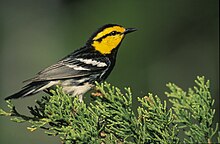The Endangered Species Act is all
that stands between the Golden-cheeked Warbler and extinction.
May 23, 2016
A well-funded group of anti-conservation interests wants to strip the warbler of its endangered status.
And it may be the first of many
victims.
In the four decades since
the Endangered
Species Act (ESA) became law, it hasn't just protected
the hundreds of species that have found themselves on the Endangered Species
List; it has also inspired proactive collaboration to protect species before
a listing becomes necessary. Last year,
when the Greater Sage-Grouse was able to remain off the list
thanks to a groundbreaking joint effort by different interest groups to
develop a plan to protect its habitat, it was a major
victory for birds, landowners, and conservationists alike.
But the Greater Sage-Grouse
success doesn't mean the ESA is obsolete—not by a long shot. The protections
of the ESA are crucial to the survival of species like the
endangered Golden-Cheeked Warbler, a small pin-striped bird that breeds
and rears its young exclusively in Texas, which has found itself at the center
of a delisting effort by groups that have an interest in developing its
habitat.
In an article for The Huffington Post, Audubon CEO David Yarnold outlines the challenges facing the Golden-cheeked Warbler:
In an article for The Huffington Post, Audubon CEO David Yarnold outlines the challenges facing the Golden-cheeked Warbler:
"The U.S. Fish and Wildlife
Service put the warbler on the endangered species list in 1990 because its
habitat in Hill Country was being sliced up and sold off to developers at such
an alarming rate.
Even with the protection of the act, an estimated 1.5 million acres (nearly a third of the Golden-cheeked Warbler’s home range) disappeared between 1999 and 2011.
Even with the protection of the act, an estimated 1.5 million acres (nearly a third of the Golden-cheeked Warbler’s home range) disappeared between 1999 and 2011.
And now a coalition of groups and
individuals would like to strip the warbler of its safety net altogether so
developers have an easier time paving over more Hill Country habitat.
The little songbird is up against
some Goliaths that include former Texas Comptroller, Susan Combs and current
Texas Land Commissioner George P. Bush—grandson of former President George H.
W. Bush—along with a foundation supported by billionaire David Koch."

No comments:
Post a Comment